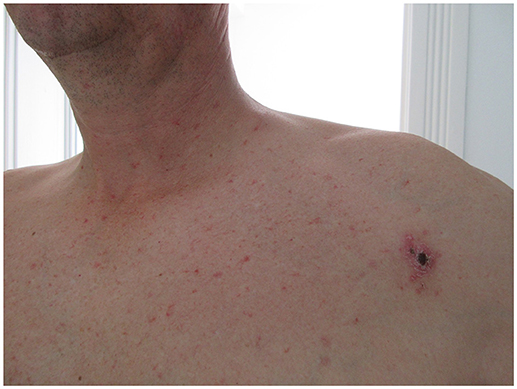Archive for the ‘Tularemia’ Category
Portugal: First Case of Tularemia
Saturday, December 8th, 2018Case Report

“……A previously healthy 47-years-old male developed abruptly malaise, high fever (40°C) and chills only 3 days after walking and sleeping in the countryside of the island of Bornholm (Denmark) during summer season. He also reported profuse night sweats, a small left infraclavicular non-painful cutaneous lesion. The patient did not report outdoor activities in the month before and did not recall any tick bite. Three days later the fever vanished and he was first observed in a hospital in Berlin. He was prescribed with amoxicillin/clavulanate 875mg/125mg twice-a-day for 7 days.
On the 15th day of disease, he was observed in Portugal because of ongoing malaise. During the observation he did not complain of respiratory symptoms nor headache.
He presented a non-pruritic macular erythematous rash of the trunk, a non-painful left infraclavicular cutaneous lesion covered with a black crust suggestive of a skin eschar and multiple small painless, non-adherent cervical, and axillar lymphadenopathies……”
The tricky tularemia bacterium
Thursday, May 31st, 2018NIH scientists show how tularemia bacteria trick cells to cause disease
 A female Aedes mosquito.NIAID
A female Aedes mosquito.NIAIDWhat
Francisella tularensis is the bacterium that causes tularemia, a life-threatening disease spread to humans via contact with an infected animal or through mosquito, tick or deer fly bites. As few as 10 viable bacteria can cause the disease, which has a death rate of up to 60 percent. Scientists from the National Institute of Allergy and Infectious Diseases — part of the National Institutes of Health — have unraveled the process by which the bacteria cause disease. They found that F. tularensis tricks host cell mitochondria, which produce energy for the cell, in two different phases of infection. In the first eight hours of infection, the bacteria increase mitochondria function, which inhibits cell death and prevents the cell from mounting an inflammatory response to avoid an immune system attack. In the 24 hours after, the bacteria impair mitochondrial function, undergo explosive replication and spread. These basic science findings could play a role in developing effective treatment strategies, according to the researchers.
Previously, researchers discovered that F. tularensis could inhibit inflammation following infection of immune system cells called macrophages, but they did not understand how it occurred. The new study, published in Infection and Immunity, illuminates that process, confirming that the bacterium’s manipulation of the mitochondrial machinery in the host cell is required to block strong inflammatory responses. Also, the researchers show that the timing of the manipulation of the mitochondria machinery during infection is important to how the bacteria control host cell death. The researchers also said this could be the first study to show that a bacterium’s sugar-like protective outer capsule, or polysaccharide, can increase mitochondria function, in this case, during early infection.
The researchers believe that better antimicrobial treatment strategies — against F. tularensis and possibly other pathogens — could result from further study of the role the capsule polysaccharide plays in manipulating mitochondria. For example, learning how to block the increased mitochondrial function in phase one could limit infection, they say. In their study, they also treated F. tularensis-infected macrophages in the laboratory with two types of drugs that protect mitochondria. The treatment reduced cell death and limited bacterial replication. The group plans to extend that work to mice.
Article
F Jessop et al. Temporal manipulation of mitochondrial function by virulent Francisella tularensis to limit inflammation and control cell death. Infection and Immunity DOI: 10.1128/IAI.00044-18 (2018).

